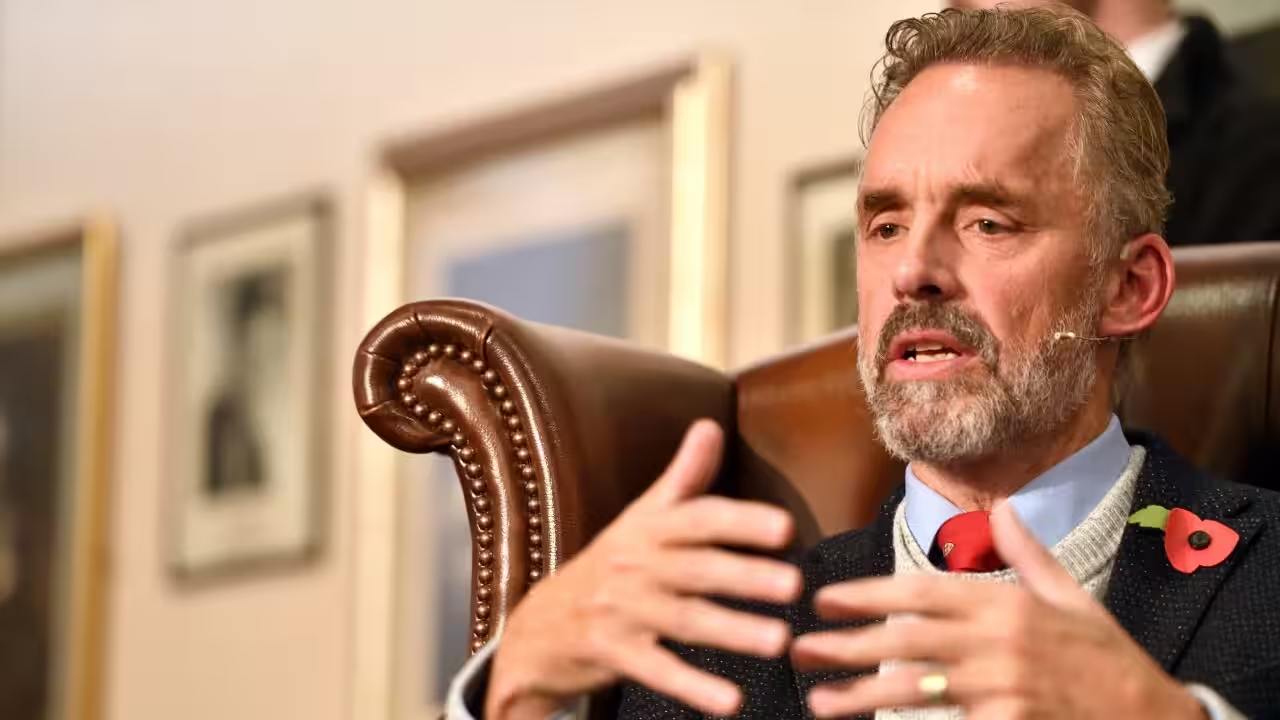Why Jordan Peterson’s Competence-Based Hierarchy Fails
Why Jordan Peterson’s “Competence-Based Hierarchy” Narrative Fails: Why the World Needs Women in Power
Jordan Peterson often argues that societal hierarchies are rooted in competence rather than systemic oppression. He claims that these structures emerge naturally, reflecting meritocratic principles rather than deliberate inequality. But this idea crumbles when we critically examine historical and current evidence, particularly in the context of gender. It’s not just misguided; it’s toxic. It perpetuates a system of oppression that holds back not only women but also the entire fabric of society, including men, by clinging to archaic gender roles that no longer serve humanity’s collective good.
Here’s why this notion is counterproductive and why a world with women in power would lead to a safer, more equitable, and thriving society.

Jordan Peterson’s Interpretation of Jungian Archetypes vs. Carl Jung’s Original Concepts
Jordan Peterson, a clinical psychologist, has extensively discussed Carl Jung’s concept of archetypes, particularly focusing on masculine and feminine energies. However, his interpretations have been critiqued for diverging from Jung’s original ideas.
Carl Jung’s Perspective:
Peterson often portrays masculine and feminine archetypes as distinct and opposing forces. He associates masculinity with order and femininity with chaos, suggesting a natural tension between the two. This perspective can imply a hierarchical relationship, where one force dominates the other, rather than a balanced integration.
Jordan Peterson’s Interpretation:
Peterson’s interpretation contrasts with Jung’s emphasis on balance and integration. By framing masculine and feminine energies as oppositional, Peterson’s view may reinforce traditional gender roles and hinder the pursuit of psychological wholeness that Jung advocated.
Jordan Peterson Quote
“The people who hold that our culture is an oppressive patriarchy, they don’t want to admit that the current hierarchy might be predicated on competence.”
Analysis of Jordan Petersons Perspective:
These statements suggest a perspective that downplays systemic gender inequalities and may perpetuate traditional power structures. Such views can be counterproductive to efforts aimed at fostering an inclusive and equitable society.
By critically examining these interpretations and statements, we can better understand the implications of Peterson’s views on gender and societal structures.
Influence on Male Audiences
Peterson’s teachings have resonated with many young men, some of whom feel marginalized in contemporary society. While his advice on personal development can be constructive, there is concern that certain individuals may misinterpret or misuse his messages to justify misogynistic attitudes or behaviors. For instance, some men involved in the “manosphere”—online communities that often promote anti-feminist views—cite Peterson’s work to support their beliefs.
The Myth of Competence
Peterson’s idea hinges on the assumption that current hierarchies are based on competence, yet history tells a different story. Power has historically been concentrated in the hands of men, not because they were inherently more capable, but because systemic barriers excluded women from the playing field.
Women were denied education, property ownership, voting rights, and access to professions for centuries. Were women less competent during those times? No. They were simply barred from the opportunities to demonstrate their abilities. Even today, women continue to face discrimination in hiring, promotion, and pay, despite equal—or superior—qualifications.
Competence, as Peterson frames it, has often been defined by physical strength or aggression—traits that may have been advantageous in a hunter-gatherer society but are irrelevant in a modern, knowledge-based economy. If we truly prioritized competence today, we would see women leading at every level. Why? Because women’s leadership traits, like empathy, collaboration, and long-term vision, are the exact qualities needed to solve our most pressing global challenges.

Why Women Should Lead the World
1. Women Prioritize Safety and Community Well-Being
Research shows that women in leadership roles are more likely to prioritize policies that benefit families, children, and communities. A world led by women would likely experience fewer wars. Men have historically driven conflicts, often for ego or power, while women are statistically more likely to prioritize peace and diplomacy. Empathy and a nurturing approach to conflict resolution are not signs of weakness; they are signs of strength.
2. Women Are Systematically Held Back
Peterson’s claim of a merit-based hierarchy conveniently ignores the systemic barriers women face. Consider the following:
• The Gender Pay Gap: Women are paid less for the same work, even when they have the same qualifications and experience. This disparity compounds over a lifetime, affecting everything from homeownership to retirement savings.
• The Pink Tax: Women are charged more for products and services simply because they’re marketed to women.
• Unpaid Labor: Women do the majority of unpaid labor, including child-rearing, elder care, and household management. This work, essential to the functioning of society, is undervalued and unrecognized economically.
• Violence and Harassment: Women disproportionately experience domestic violence, sexual harassment, and abuse, often with little systemic support to ensure their safety.
These factors demonstrate that women start life at a significant disadvantage. The idea that they simply “aren’t competent enough” to rise through the ranks is laughable when they are actively being held back.
3. A World With Women in Power Would Be Safer
If women ruled the world, we would likely see policies that prioritize the safety and well-being of all. Studies have shown that women are more likely to invest in social services, healthcare, and education—areas that directly improve the quality of life for families and communities.
For example, women leaders are more likely to focus on food security, ensuring resources are distributed equitably. In contrast, male-dominated power structures often prioritize profit over people, leading to inequality and instability.
Additionally, empathy—a trait often associated with women—is crucial for addressing issues like climate change and global poverty. Women are more likely to take a long-term view of these challenges, focusing on sustainability rather than short-term gains.
Jordan Peterson Quote
“The patriarchy is just a name terrible intellectuals have given to the competence hierarchy that makes the world work.”
The Systematic Oppression of Women

Peterson’s narrative erases the systemic oppression that has shaped gender dynamics. Patriarchal systems have long controlled access to power, resources, and opportunities, ensuring that men remain dominant. These systems are not natural or inevitable; they are constructed and upheld by those in power.
Even today, women in leadership positions face more scrutiny and criticism than their male counterparts. They are judged not only on their competence but also on their appearance, demeanor, and personal lives—standards that men are rarely held to.
If we were to dismantle these barriers, we would see a world where women excel, not because of quotas or “special treatment,” but because they are equally—if not more—competent.
Toxic Narratives Harm Everyone
The idea of competence as defined by physical dominance or traditional gender roles doesn’t just harm women; it harms men too. It forces men into rigid expectations of masculinity, discouraging emotional vulnerability, caregiving, and collaboration.
A society that values empathy and cooperation benefits everyone. Men, too, would thrive in a world where success isn’t defined by aggression or dominance but by collaboration and emotional intelligence.
Conclusion: A Call for True Competence
If we truly want a merit-based society, we need to dismantle the systems that have historically excluded women. Competence isn’t about physical strength or aggression—it’s about the ability to lead with vision, empathy, and resilience. Women have demonstrated these qualities time and again, often in the face of systemic barriers.
A world led by women would be safer, more equitable, and more sustainable. It’s time to reject the toxic narratives that perpetuate oppression and embrace a future where leadership is based on true competence—one that values humanity over hierarchy.
Additional Controversy – Articles and Video about Jordan B Peterson’s Addiction, Pushing Forced Monogamy, Love for Horror and Russia and Lack of Accountability – Dr. Peterson Not Walking His Talk
Exerpt from New York Times, article written by Nellie Bowles
Dr. Jordan B Peterson wants forced monogamy to prevent misogynistic murders by incels.
“Mr. Peterson’s home is a carefully curated house of horror. He has filled it with a sprawl of art that covers the walls from floor to ceiling. Most of it is communist propaganda from the Soviet Union (execution scenes, soldiers looking noble) — a constant reminder, he says, of atrocities and oppression. He wants to feel their imprisonment, though he lives here on a quiet residential street in Toronto and is quite free.”
“Recently, a young man named Alek Minassian drove through Toronto trying to kill people with his van. Ten were killed, and he has been charged with first-degree murder for their deaths, and with attempted murder for 16 people who were injured. Mr. Minassian declared himself to be part of a misogynist group whose members call themselves incels. The term is short for “involuntary celibates,” though the group has evolved into a male supremacist movement made up of people — some celibate, some not — who believe that women should be treated as sexual objects with few rights. Some believe in forced “sexual redistribution,” in which a governing body would intervene in women’s lives to force them into sexual relationships.
Violent attacks are what happens when men do not have partners, Mr. Peterson says, and society needs to work to make sure those men are married.
“He was angry at God because women were rejecting him,” Mr. Peterson says of the Toronto killer. “The cure for that is enforced monogamy. That’s actually why monogamy emerges.”
Mr. Peterson does not pause when he says this. Enforced monogamy is, to him, simply a rational solution. Otherwise women will all only go for the most high-status men, he explains, and that couldn’t make either gender happy in the end.
“Half the men fail,” he says, meaning that they don’t procreate. “And no one cares about the men who fail.”
I laugh, because it is absurd.
“You’re laughing about them,” he says, giving me a disappointed look. “That’s because you’re female.”
But aside from interventions that would redistribute sex, Mr. Peterson is staunchly against what he calls “equality of outcomes,” or efforts to equalize society. He usually calls them pathological or evil.
He agrees that this is inconsistent. But preventing hordes of single men from violence, he believes, is necessary for the stability of society. Enforced monogamy helps neutralize that.“
What are your views and concerns about Jordan Peterson’s influence on young insecure men?
Holistic Trauma Healing Program

NEWSLETTER





